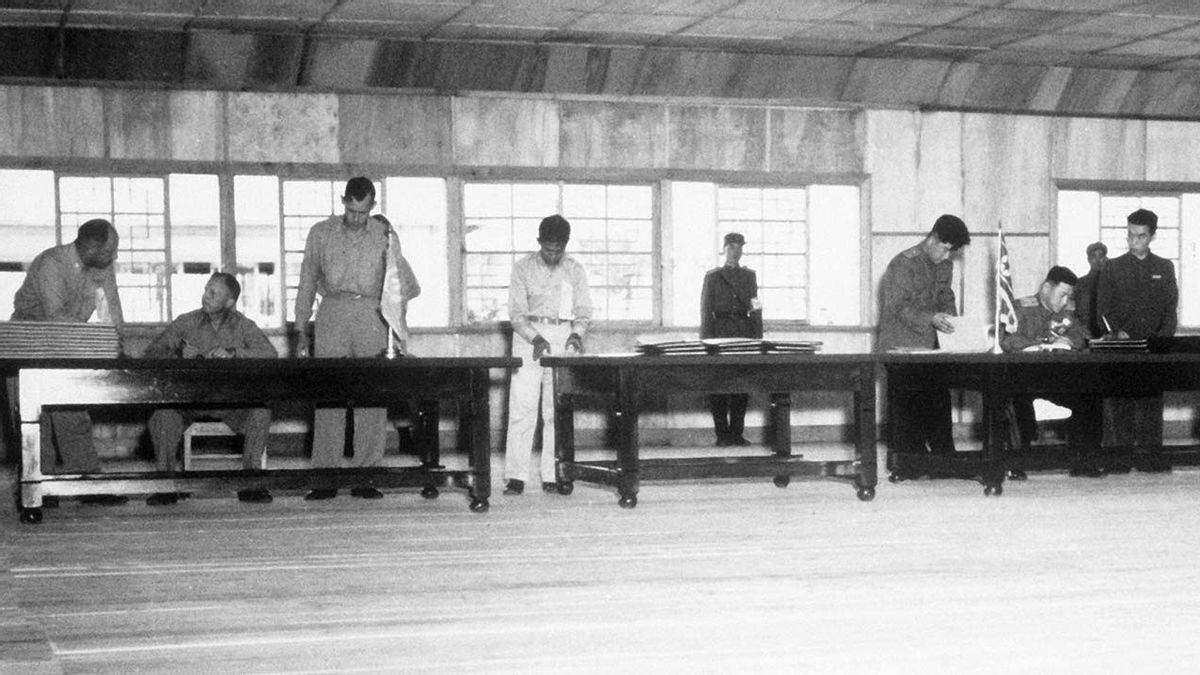JAKARTA - There has been no official peace agreement that ended the Korean War, only a truce. Nevertheless, the agreement is very important to keep the Korean Peninsula conducive. And in turn, it brings many economic prospects, especially for South Korea (South Korea).
The truce was signed July 27, 67 years ago in 1953, as reported by the BBC. The agreement document was signed by General Nam Il from North Korea (North Korea), General William K Harrison representatives of the United Nations (UN) and the party from China, Peng Dehuai. Meanwhile, South Korea was not directly involved in the signing of the agreement.
The peace talks taking place in what is now Korea's demilitarized zone, Panmunjom, are actually not final. At a Conference in Geneva in 1954 designed to negotiate a formal peace treaty, it ended without agreement.
But at least the 1953 ceasefire that ended a three-year physical feud gave birth to several points of agreement. The first is to suspend open hostilities, establish a border line with a 4 km buffer zone called the demilitarized zone and organize a mechanism for the exchange of prisoners of war between the two sides.
In addition, the agreement also calls for the establishment of a Military Ceasefire Commission (MAC) and other agencies to ensure a ceasefire is carried out. MAC, which consists of members of both parties, still regularly meets at the Panmunjom truce village.
The ceasefire agreement has not always gone smoothly. Both North and South Korea still accuse each other. The accusations are increasingly widespread as North Korea's nuclear program progresses.
But at least, this ceasefire is an important step, in addition to maintaining peace it also brings economic prospects. On the issue of peace, the Korean ceasefire succeeded in reducing a conflict that could potentially spark a Third World War.
Boosting the South Korean economySouth Korea, which at that time was under the leadership of President Syngman Rhee, initially refused to sign a ceasefire directly. However, with US persuasion through the United Nations, South Korea finally melted away. The US-South Korean alliance became even closer after the incident.
Then, the South Korean Congress ratified the alliance into law the following year. This agreement, according to the President of the NGO The Korea Society, Thomas J Byrne in his writing in Bloomberg, provides a strategic foundation for security and political relations between the US and South Korea. This relationship develops into a deep partnership to commit to realizing ideals as a democracy.
It also brings economic benefits. The South-US alliance, which is still well-maintained until now, helps strengthen South Korea's financial defense. Among other things, it provides important support for investor confidence and allows for a safe position regarding government debt that developed countries might envy.
As of 2017, South Korea has succeeded in achieving per capita income in terms of purchasing power parity of US $ 38,300. According to Byrne, the economic conditions were slightly higher than Spain's.
The English, Chinese, Japanese, Arabic, and French versions are automatically generated by the AI. So there may still be inaccuracies in translating, please always see Indonesian as our main language. (system supported by DigitalSiber.id)









